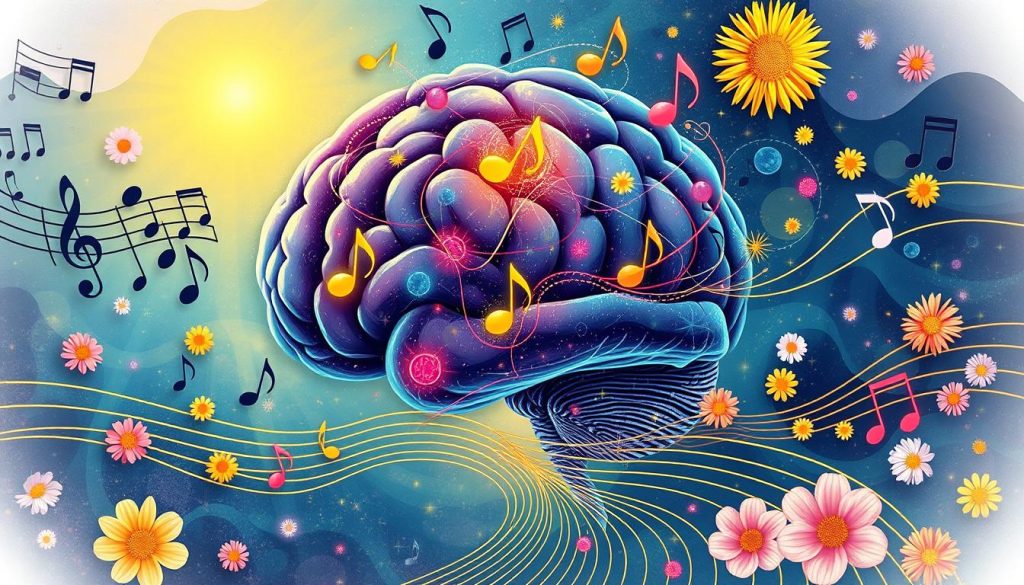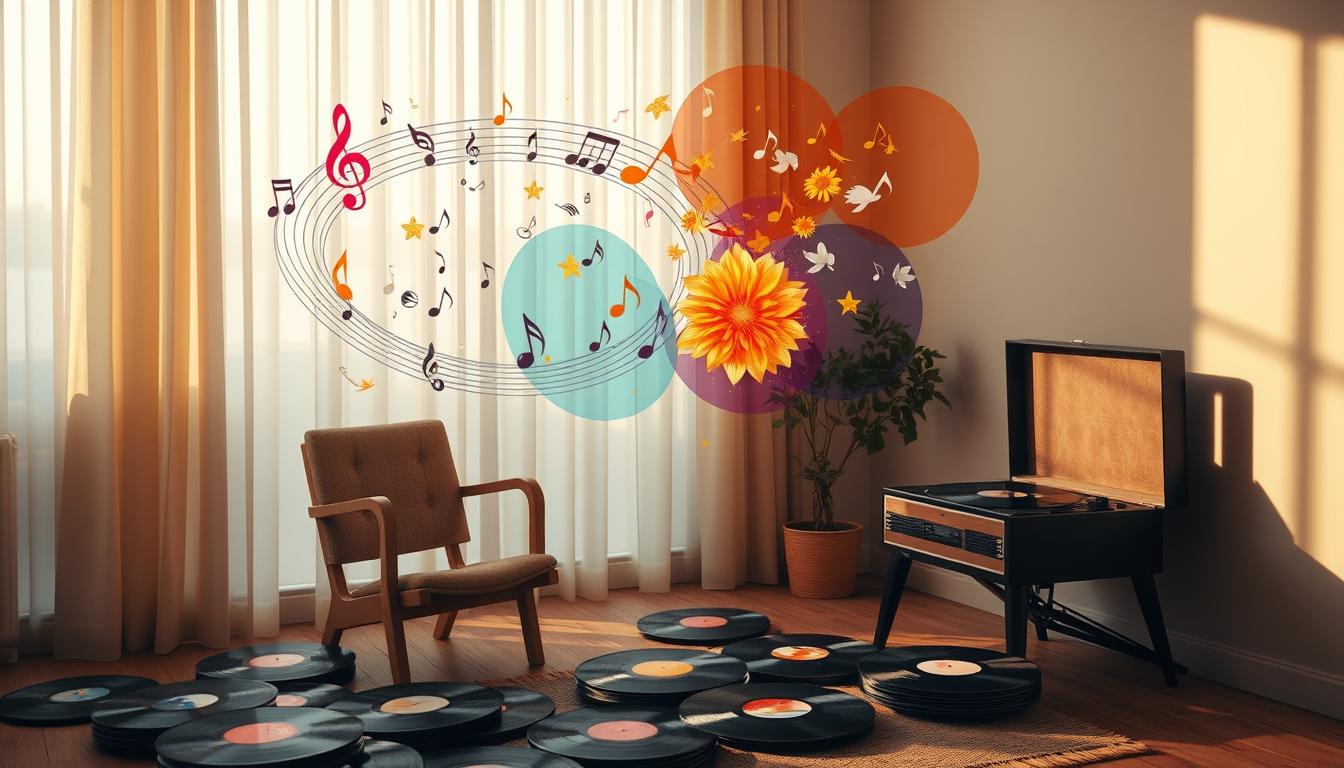Have you ever wondered if the music you listen to could actually play a significant role in relieving your depression?
Music therapy is gaining recognition as an effective form of emotional healing. Studies have shown that music engages both the brain and the heart. This offers profound depression relief and enhances mental health. By harnessing the power of music, you can create a non-pharmacological path to a brighter mood and improved mental state.
Quick Recommendation: Our blog covers the healing power of music and how it can help alleviate depression. If you want a program to add to your toolkit in combatting depression, we recommend the InnaPeace program.
Introduction
Music is a big part of our lives, touching our deepest emotions. Whether you love classical, jazz, or pop, music connects with us deeply. It’s known for its healing effects, helping our mental health in many ways.

Think of a time when you felt down and then your favorite song came on. That feeling of nostalgia or happiness can really lift your mood. This article explores how music can help fight depression and boost emotional wellness. You’ll see how music is more than just sound; it’s a powerful tool for our mental health.
What is Music Therapy?
Music therapy uses music to help people with emotional, cognitive, and social needs. Certified music therapists create special plans for each person. They use different music therapy techniques to meet mental health goals.

Certified music therapists get a lot of training. They learn how to meet each client’s needs. They use music to help people heal emotionally and psychologically.
This approach works well in many clinical settings. It helps people with depression and other mental health issues a lot.
The Science Behind Music and Mood
Exploring the neurochemistry of music reveals how it affects your brain. When you enjoy your favorite songs, your brain releases dopamine. This chemical is linked to happiness and reward.

Music’s impact goes beyond just feeling good. It also boosts your brain’s ability to think and remember. Listening to music activates areas of the brain linked to memory and focus. Even the beat of a song can bring back memories or motivate you.
Music also plays a role in managing stress and anxiety. The right tunes can lower cortisol levels, reducing stress. This shows how music can positively affect your mood and emotional health.
Benefits of Music for Mental Health
Music has a big impact on our mental health, offering many benefits. One key advantage is stress reduction. Listening to calming music or your favorite songs can lower stress hormones. Genres like classical or ambient music are great for relaxing.

Music also boosts cognitive performance. Playing an instrument or just listening can improve memory and problem-solving. This is good for students and workers who want to be more productive.
Music is also a powerful way to express emotions. Whether you’re feeling happy, sad, or anything in between, there’s a song for you. This emotional connection can be very healing, helping you deal with hard feelings.
Research backs up these benefits. Studies show music therapy helps with depression and anxiety. People also share how music has changed their lives, making them feel better.
Music can help with stress, improve thinking, and express feelings. So, put on your headphones, press play, and let music help your mental health.
Choosing the Right Music for You
Finding the right music can really boost your mood. Start by checking out different genres and artists. This way, you can discover a wide range of sounds and styles.
From classical to rock, jazz to pop, exploring various music types helps you find what you like. It helps you understand your music preferences better.
Think about how music makes you feel. Do some songs make you happy, while others calm you down? This can help you pick music that fits your mood and needs.
Also, consider the lyrics and music composition. Songs with lyrics that touch your heart can add depth. Instrumental tracks might offer a peaceful or uplifting atmosphere. Adjusting your playlist to match your mood can enhance your emotional state.
The aim is to make your music listening a positive experience. By choosing music that resonates with you, you can use it as a powerful tool for emotional support.
Quick Recommendation: Our blog covers the healing power of music and how it can help alleviate depression. If you want a program to add to your toolkit in combatting depression, we recommend the InnaPeace program.
Creating a Healing Playlist
Creating healing playlists is a personal and rewarding journey. Think about what emotional support you need. Do you want to relax, get energized, or feel more positive? Organize your playlists to match these moods or activities for the best results.
Start by picking songs that touch your heart. Look for tracks that have lifted your spirits or soothed your mind before. Mix in new finds with old favorites for a rich listening experience.
Your playlists can grow and change over time. Add new artists and genres to keep things exciting. This keeps your playlists relevant and supports your emotional well-being.
Also, check out pre-made playlists on Spotify or Apple Music. You can tweak them to fit your taste and needs. This way, your playlists offer the comfort and support you’re looking for.
Group Activities and Music
Getting involved in community music programs can really help your mental health. These programs help you make friends and feel connected. This is key for your emotional and mental well-being.
Music has a way of bringing people together. It offers a shared experience that’s very healing. Group therapy often uses music to create a sense of unity and support. This shared journey can help people overcome mental challenges.
Community music programs are more than just fun activities. They’re a chance to build friendships. Whether it’s singing in a choir, playing drums, or being in a band, making music with others is rewarding.
These programs also act as group therapy. When you make music with others, you’re not just making sounds. You’re building bonds, expressing feelings, and finding comfort in shared moments. This can greatly reduce feelings of loneliness and provide a space for emotional expression.
Through community music programs, you can find a new way to connect with others and improve your mental health. Music-based group therapy lets you experience music’s healing power while making lasting friendships.
Music and Physical Activity
Working out can seem tough, but music can make it easier. It helps you move in time, making hard exercises feel like fun.
Make a playlist with songs that get you pumped up. Music is more than background noise; it’s a key part of your workout. The right song can make you feel good and want to keep moving.
When you move to the music, you get better and more focused. It helps you ignore the hard parts of working out. This makes it easier to keep going and stay active.
Music also has big health benefits. It can make your heart stronger, improve your endurance, and boost your overall health. So, turn up the music next time you work out. Let it help you live a healthier, more active life.
Tips for Integrating Music into Your Daily Routine
Adding music to your daily life is easy. Start by making a playlist that matches your mood and activities. This simple step can greatly improve your day.
Listen to your favorite songs on your way to work. It sets a positive mood for the day. Morning music can also get you ready for what’s next.
At work, soft music can make the atmosphere calm and boost your focus. Choose instrumental or quiet songs that won’t interrupt your work. This way, you stay focused and improve your work environment.
Take a few minutes during breaks to listen mindfully. Whether walking or sitting quietly, let the music lift your spirits. It’s a great way to refresh your mind and brighten your day.
In the evening, use music to relax. Soft tunes help calm your mind after a busy day. It’s a great way to prepare for a good night’s sleep.
Find what works for you by trying different music and times. The goal is to make music a seamless part of your daily life. It should enhance every part of your day.
Common Obstacles and How to Overcome Them
Many people face challenges when trying to add music to their self-care routine. Issues like no internet or not being able to buy music can stop music’s healing effects. But, you can find free streaming services like Spotify’s free tier or YouTube’s music library. Public libraries also have big music collections you can borrow.
What music you like can greatly affect how well it helps you. Everyone’s tastes are different. To find the right music, try out different genres and styles. Sometimes, trying new music can lead to finding new favorites.
There are also myths about music therapy that need to be cleared up. Some think it’s not based on science or doesn’t really work. But, there’s a lot of research showing music’s positive effects on the brain and mood. This makes music a real and valuable tool for mental health.
By tackling these obstacles, you can make music a bigger part of your self-care. Overcoming issues with access and finding music you like, while debunking myths, makes music a powerful tool for everyone.
Conclusion
Embracing the healing journey is a deeply personal experience. Understanding music’s transformative role can be incredibly empowering. Through this article, you’ve learned how music therapy can ease the weariness of depression.
By exploring the science behind music and mood, you’ve seen its power in mental health care. Music’s neural connections make it a potent tool. This art form can be a balm for the soul.
Integrating music into your routine is easy. It’s as simple as choosing the right tunes for your day. Creating a personalized playlist or joining group music sessions can boost your mental well-being.
Each note and rhythm is a step forward in your healing. It fosters a sense of connection and relief. Music can significantly enhance your mental health.
As you continue your mental health journey, remember music’s support. Its role in soothing and uplifting the spirit is unmatched. Allow yourself to immerse in this harmonious escape.
Make music a cornerstone in the battle against depression. Through melody and rhythm, you can find solace and strength. This will guide you towards a future filled with hope and resilience.
Quick Recommendation: Our blog covers the healing power of music and how it can help alleviate depression. If you want a program to add to your toolkit in combatting depression, we recommend the InnaPeace program.

